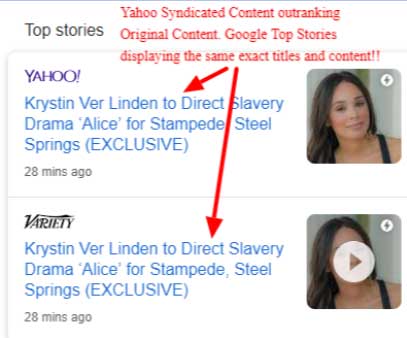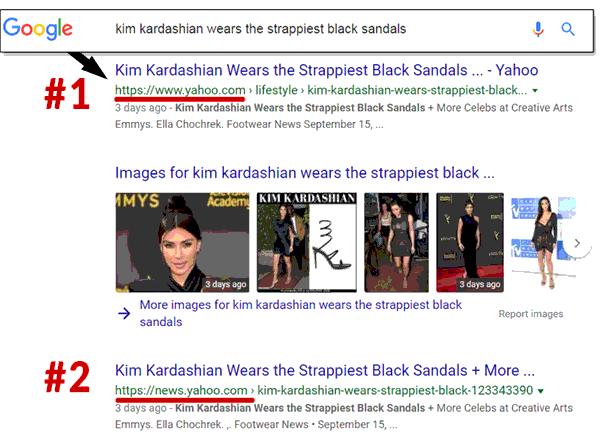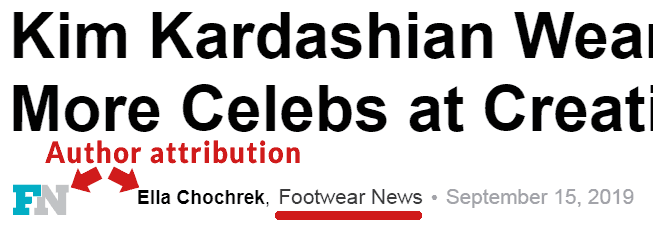Google Still Ranking Syndicated Content Over Original Publishers – Despite Recent Announcement
This article from
Google has made quite a big thing recently about its new algorithm update which is intended to rank original news content higher on SERPs. However, John Shehata from Condé Nast has caught Google still ranking syndicated content higher – the example he uses is Yahoo News. It’s kind of hard to work out why this is happening, but there are a few possibilities.
Recently I see a lot of instances where Google Top Stories ranking syndicated content from Yahoo above or instead of original content. This is disturbing especially for publishers. Yahoo has no canonicals back to original content but sometimes they link back. pic.twitter.com/IsE6EQofNZ
— John Shehata (@JShehata) 16 September 2019
Maybe it’s just that Google is still working this all out, but there may be a few holes in its new algorithm. Take the following screenshot. Google is showing the exact same news story twice – one is the syndicated version, the other is the original. Both were published at exactly the same time, and that fact could suggest it’s why the new algorithm showed them both.

Let’s take a look at what Google said when they announced they’d be elevating original reporting in Search:
“.…we’ve made changes to our products globally to highlight articles that we identify as significant original reporting. Such articles may stay in a highly visible position longer. This prominence allows users to view the original reporting while also looking at more recent articles alongside it.”
All the evidence is conflicting here. However, the above screenshot and statement fragment might support a theory based around the fact that Google presented both versions of the same article because they were published simultaneously. A commitment to prioritize “more recent articles” may well be getting syndicated content on the same page as original news stories in results – but that doesn’t really explain why Yahoo is outperforming the original article and grabbing the top spot most times.
For Google, alongside its new commitment to give original reporting more weight, there’s also a need to turn out good quality results and give a good user experience. You could argue Google is getting that wrong when it consistently ranks syndicated content higher, and that producing the same article twice is flying in the face of great user experience. So, could this be more about site authority?

In the above search results, Yahoo grabs positions one and two. Is what we’re seeing an algorithm which isn’t giving smaller news sites the credit they deserve? Could that be because Yahoo isn’t doing its bit to credit syndicated publishers? Well, it’s hard to make that case when Yahoo is clearly doing so at the top of news stories:

So what is going on? In the case of Kim Kardashian’s new sandals, is Footwear News suffering for lack of authority in Google’s eyes? The Search Engine Journal article makes another good point about licensed images in news stories. While Footwear news is not using original images in its piece – and could suffer ranking wise as a result – neither is Yahoo when it syndicates the article. Back to the drawing board then.
What about Accelerated Mobile Pages (AMPs)? They’re a method for delivering web pages quickly to mobile devices and Google could well be giving that weight. Footwear News doesn’t use AMP, but Yahoo does. Another factor could be that Footwear News isn’t using structured data correctly to indicate that it’s publishing news content.
Whatever the reason(s) for syndicated content appearing higher on SERPs, Google seems to be having trouble identifying what’s original and what’s not. In the case of the above Yahoo content, the site did use canonical URLs, but they pointed back at Yahoo content instead of the actual source. Google admits that finding the original publisher in cases like this is difficult. Danny Sullivan from Google:
If people deliberately chose to syndicate their content, it makes it difficult to identify the originating source. That's why we recommend the use of canonical or blocking. The publishers syndicating can require this. https://t.co/hblGLsD0ir pic.twitter.com/yjtx43II8j
— Danny Sullivan (@dannysullivan) 18 September 2019
Recommending canonicals is one thing, but can we expect Yahoo to agree to that? Shouldn’t Google be able to figure out who wrote the original article anyway? Yahoo is clearly crediting the author and source site at the top of news pages!
Prioritizing syndicated content clearly isn’t in the spirit of elevating original reporting. Publishers can’t be happy about it – as Condé Nast’s John Shehata indicated in his tweet. So, is Google’s new algorithm going to make syndication of content just one more area where the big sites have a massive advantage over smaller sites? With so much syndicated content about, is that going to defeat the object of Google’s announcement and make internet news less diverse?

